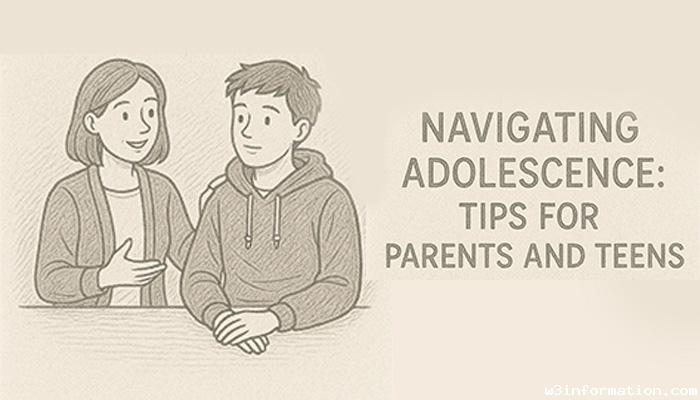Navigating Adolescence: Tips for Parents and Teens
Both teenagers and their parents experience transformation during the adolescent phase. The adolescent phase brings substantial emotional, physical, and psychological transformations which create both exciting possibilities and difficult obstacles. Teens experience a period of exploration where they learn about themselves while gaining independence and encountering new situations. Parents need to find equilibrium between allowing their child autonomy for development and providing necessary guidance and structure. Successful navigation through adolescence depends on open communication, understanding between family members and mutual respect. This blog provides actionable advice for both teens and parents to transform this developmental stage into an empowering journey.
Communication is Key
A healthy parent-teen relationship depends on effective communication as its core element. Parents and teens need to establish an environment where they can freely communicate their thoughts and feelings and raise their concerns.
a. For Parents:
Listen Actively: Support your teen by creating a safe space where they can share their thoughts and emotions with no fear of negative judgment. Active listening requires parents to pay full attention to their teen's words without interrupting or dismissing their stories. This activity creates a foundation of trust which encourages open conversations.
Ask Open-Ended Questions: You can prompt more detailed conversations by asking open-ended questions such as "What was the best part of your day?" Could you share your feelings regarding that situation? These kinds of questions invite deeper conversations.
Avoid Overreacting: During adolescence teens experience emotional extremes and parents should avoid overreacting to minor mistakes or rebellious behavior. When you maintain your composure your teen will feel listened to and valued.
b. For Teens:
Be Honest and Open: Tell your parents what you think and what worries you despite your fear of their reaction. When you choose to be honest with your parents they will likely offer you their support.
Express Your Needs: Let your parents know about your need for more privacy or space through respectful communication. Give equal importance to understanding their worries by listening to what they think.
Avoid Arguments: Whenever you find yourself upset or frustrated during a conversation, pause the discussion and resume it later when you can maintain a calm demeanor. Respectful communication will help prevent misunderstandings.

Setting Boundaries and Respecting Independence
During adolescence teens begin to desire more independence while pushing against established limits. Parents must support their teen's developing autonomy but reasonable boundaries provide essential safety and security.
a. For Parents:
Set Clear Expectations: Ensure your teen understands the rules pertaining to curfews, screen time, chores and schoolwork and the consequences for not following them. Teens benefit from clear expectations because they provide structure that aids responsible decision-making.
Give Responsibility Gradually: When your teen exhibits growth in maturity and responsibility you should start giving them more freedom to choose their own clothes and manage their time and social activities.
Respect Their Privacy: Parents should maintain involvement in their teenager's life but must also acknowledge their privacy rights. Always knock before entering their room and never read their messages unless they permit you to do so while letting them talk privately with friends.
b. For Teens:
Be Responsible: Your parents need to see that you can take care of the responsibilities they assign to you. Your responsibilities to your parents could involve organizing homework tasks effectively while maintaining your curfew and monitoring your daily schedule.
Respect Boundaries: Your desire for independence should match your parents' need for respect. Always observe their rules and address any disagreements through peaceful and respectful communication.
Be Honest About Your Needs: When you feel your parents are too controlling or you require more personal space you should engage in an open dialogue about your feelings and collaborate to find a solution that satisfies everyone.
Building Emotional Intelligence
The turbulent nature of adolescence demands emotional understanding to successfully manage this developmental stage. When parents and teens develop emotional intelligence they are better equipped to process and control their emotions.
a. For Parents:
Teach Emotional Regulation: Assist your teen in building effective ways to handle stress and emotional difficulties. Help teenagers identify their emotions and adopt positive coping strategies like physical activity, writing in a journal, or discussing their feelings.
Model Healthy Emotions: Parents serve as important role models for their teens who learn through observation. Your teen will better manage their emotions when you demonstrate how to handle stress and frustration in a calm and healthy manner.
Validate Their Feelings: Teens need to feel supported when they express emotions even when their parents do not fully understand or agree with what they are feeling. Expressions such as "I can see you're upset" and "It makes sense that you're frustrated" demonstrate both respect and empathy towards their emotional condition.
b. For Teens:
Recognize and Label Your Emotions: Understanding your emotions can be challenging but labeling what you feel offers meaningful assistance. Which emotions are you experiencing right now: sadness, anxiety, being overwhelmed, or excitement? When you recognize your emotions you get better at expressing them to people around you.
Practice Self-Care: Practice self-care techniques to handle stress by exercising regularly and spending time with friends as well as pursuing hobbies that bring you joy. Physical and emotional self-care practices enable people to handle challenging circumstances more effectively.
Seek Support: Reach out to a friend you trust or a family member when you find yourself unable to manage your feelings and consider seeing a counselor as well. People who ask for help when required demonstrate strength not weakness.
Promote Healthy Habits
Physical health and mental well-being go hand-in-hand. Adolescence is key for developing health practices that establish foundations for wellness throughout life.
a. For Parents:
Encourage Physical Activity: Help your adolescent maintain physical activity through organized sports teams, gym exercises or outdoor recreational activities. The human body and mind both receive multiple advantages from consistent physical exercise.
Model Healthy Eating: Make sure to serve balanced meals and snacks while helping your teen establish good eating practices. Keep junk food and sugary drinks to a minimum but avoid letting it create conflict by emphasizing balance and moderation.
Support Mental Health: The importance of mental health must stand on equal footing with physical health. Train your teen to understand it’s normal to ask for help when stress becomes overwhelming and promote their use of coping techniques such as mindfulness or relaxation strategies.
b. For Teens:
Get Active: Take part in your favorite activities such as team sports, dancing, or friend walks. Physical activity boosts mood and energy levels.
Take Care of Your Body: Maintain good health by eating different nutritious foods, staying hydrated with sufficient water, and sleeping enough every night. Body care practices enable better stress management and enhance your overall well-being.
Talk About Mental Health: When you are feeling low or anxious or overwhelmed always remember that sharing these feelings with someone you trust will help you cope. A person who asks for assistance from a parent or friend or counselor demonstrates strength not weakness.
Support Their Interests and Passions
Adolescence serves as a period for self-discovery and helping your teen pursue their interests and hobbies can develop their confidence and identity.
a. For Parents:
Encourage Exploration: Help your teen discover their interests by supporting them in experimenting with various activities and hobbies. When teens discover their passion through art, music, sports or coding they develop self-assurance and determine their life goals.
Attend Events and Celebrate Achievements: Demonstrate your support by attending your teen's performances or games as well as exhibitions related to their hobbies. Recognize their accomplishments regardless of size and express your pride in their hard work.
b. For Teens:
Explore New Interests: Spend time discovering novel activities that excite your curiosity. Embrace new experiences even when they push you beyond your familiar boundaries.
Share Your Passions: Engage your parents in conversations about your favorite activities. Expressing your passions enables you to build stronger bonds and opens the door to new possibilities.
Conclusion: Navigating Adolescence Together
Adolescence serves as an important stage for personal development through self-discovery and transformation. A strong and trusting relationship between parents and teens is possible through open communication and mutual support of emotional needs while maintaining healthy boundaries during this demanding but exciting phase. During adolescence successful relationships rely upon mutual respect together with understanding and patience. Open communication between parents and teens leads to a more durable and robust relationship after this growth period.
 Top 10 Comfort Foods to Try This Winter
Top 10 Comfort Foods to Try This Winter
 Top 10 Christmas Destinations Around the World
Top 10 Christmas Destinations Around the World
 How to Start a DIY Craft Project on a Budget
How to Start a DIY Craft Project on a Budget
 How to Build Strong Family Bonds in the Digital Age
How to Build Strong Family Bonds in the Digital Age
 The Importance of Early Childhood Education
The Importance of Early Childhood Education